Women at the (Water) Table
By Afia Salam | Environment | Published 7 years ago
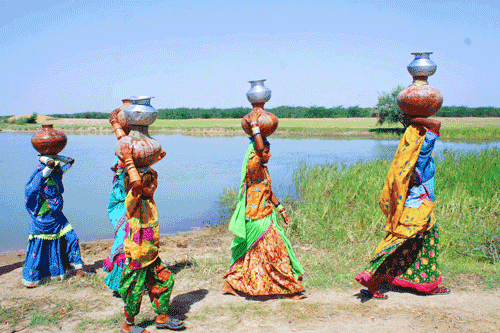
Pakistan’s water managers and water users seem to be living on two different planets. There seems to be a serious disconnect with the needs, hopes and aspirations of almost half the population of the country. Despite the focus on mainstreaming gender in all development, the relationship barely progresses beyond that of giver and receiver, the giver distributing largesse quite unmindful of whether it is having a positive impact on the receiver or not.
The National Water Policy, that took its time in seeing the light of day after decades of deliberation, finally passed through a body that stamps consensus between the federating units. After years of bickering, all four provincial chief executives put their signature on the document. That is something definitely worth celebrating. So April 18, 2018, is indeed a red letter day.
Come analysis time, and analysts and experts started to pick holes in it. That happens to the best of documents, but for a document that took decades in preparing, such omissions should have been few and far between.
However, one glaring omission was the lack of gender mainstreaming, and an implementation mechanism. Simi Kamal, geographer, water expert and founder of Hisaar Foundation says that there is just one mention of women in the entire policy document, despite the fact that the water and women nexus is fairly well established culturally and socially. She feels that once the implementation mechanism is worked on for this policy, this missing element must be embedded.
But why is it that women’s voices are left out? Ali Tauqeer Sheikh, CEO of Lead Pakistan, has a very interesting and thought-provoking explanation. He says “The entire National Water Policy approach started on the wrong foot. It sees the problem more as a distribution issue, whose solutions are traditionally led by men ‘manning’ engineering bodies like WAPDA and NESPAK. The women you see in those organisations can be counted on the fingertips. And there are none at the senior level.
“The other fallacy has been to consider water as a resource mostly for agriculture. That is tied to land tenure, which is mostly in the name of men. This has traditionally defined our approach, and the exclusion continues and we bear the social and economic costs.
“The water discourse is often reduced to an Indo-Pak issue, completely glossing over justice, equity, and access issues which are inexorably linked to women. Not including them is akin to a human body, a part of which has been severed.”
This socio-cultural linkage of women with water needs to be placed at the heart of any decision-making about water allocations, quality and access. The burden of fetching water is on women, across ethnic practices in Pakistan, especially in the rural areas. The distance eats away at the time they have for other roles they have been assigned, leaving little for opportunities for education or leisure, while the weight of the pitcher or drum they carry back ruins their posture, and impacts their bone structure.
In the urban areas, the responsibility of access may change, but women remain responsible for water management. According to a research report by Dr. Nausheen Jamil of IBA, Dr. Daanish Mustafa and Dr. Amiera Sawas of Kings College London, it has a direct bearing on violence against women, when the ‘provider’ feels that the ‘receiver’ has been injudicious in management.
Judicious use is more of a problem in the burgeoning urban centres, which are bursting at the seams, and strained due to resource constraints as well as poor distribution. This is especially so because of the changed demographic pressures on urban areas which require the allocation of corresponding resources.
Kauser Saeed Khan, a social educator and researcher who works in the Community Health field at the Aga Khan and Indus Hospitals, says, “Water is everyone’s problem and everyone’s responsibility. As such, the water solution lies in multiple strategies. It will require a concerted effort from all stakeholders. Desalination, wastewater treatment plants, conservation at all levels, improved water management and most of all, reduction in use of agricultural water to divert for urban use.”
This is crucial as all predictions are for the population balance to tilt in favour of urban centres in Pakistan. Karachi is already among the most rapidly growing cities in South Asia. This change demands a policy shift in sticking to the business as usual model of allocating the highest share of water to the agricultural sector.
Once there is rationalisation of resource allocation, the focus will have to be on gender mainstreaming because of the water and women nexus. Leading environmental lawyer, Ahmad Rafay Alam says, “Women are involved, just like men, at all levels and scales of water, be it Irrigation, drinking water or sanitation. Yet nowhere in the water policy is mention made of the role of women. Nor is the policy signed by any woman. There are no women on the policy implementation committee notified by the caretaker government. This unacceptable oversight is exclusionary and must be rectified.”
This view is corroborated by Hina Lotia, who is a water expert and has taken part in deliberations at many international forums. She says, “Water, like climate change, is a social and economic issue, not just a technical issue in the domain of engineers and meteorologists. The field has been dominated by men for way too long. I don’t see any solution to this unless women lead the governance of water in all tiers of leadership. It’s about equity, justice and inclusiveness and that is made possible by feminisation of water.
The only way to manage water scarcity is by promoting water savings through efficient domestic and agricultural use. No one is better placed to spearhead this cultural change than women who have traditionally served as water custodians. Let’s give women a chance to protect our civilisation.”
The concept of feminisation of water is fairly well understood and established amongst serious water scholars. But it needs to go out of that closed circle to penetrate the group of decision-makers who are not leaving the door open to allow the women in.
Sanaa Buxamoosa, General Manager at Hisaar Foundation, puts it succinctly by saying, “The value of women’s perspective is not known to many, especially men. I believe the perspective of all must be heard. That of women, minorities, and the marginalised is ignored by those in power. Policy-makers must be those who need to benefit the most – women, and the marginalised. That would be true democracy.”
Not just patriarchy, or outright misogyny are involved, but there is a power play in the discussion, decision and distribution of this precious resource. Marginalised men, the poor, or the lower riparians, tail-end farmers in the rural areas, and people of the municipal supply network in the urban areas all suffer.
It is encouraging to know the emphatic stance of the PM’s Advisor on Climate Change, Malik Amin Aslam, about the role of women in the water discourse.
He says, “Women are one of the worst victims of climate-related impacts, especially water stress and also remain one of the biggest agents of change while adapting and facing up to environmental challenges. Their role and voice in all policy making is thus of critical importance. This is especially true of the water policy. I’m not sure how or whether this voice has been incorporated in the policy, and if any gaps remain in this respect, they need to be filled through a process of integrated stakeholder consultation.”
We hope Aslam’s personal views will have a bearing on the official attitude of the new dispensation in power, which has so far not really been a source of great comfort where women’s inclusion in decision-making is concerned. However, in the water sector, we hope his acknowledgment of women as agents of change will help to change the status quo.
There has been debate and discourse over the strengths and weaknesses of the National Water Policy, but even women heading important national programmes and institutions say they had no part in its formulation. There seems to be a case of severe gender blindness, where those representing almost half the population of the country have no say in policy matters.
The times when opportunities and a level playing field were presented to women have been few and far between. Most have had to fight many battles to get where they are today. Some struggled more, some less, but all have proven their worth in their chosen fields. International recognition has been more prompt than national.
We have compiled a ready reference list here. The list is not in any order or priority or preference or seniority.
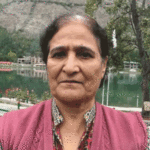
Dr. Zaigham Habib
Dr Habib has done hydraulic and sediment modelling, prepared disaster risk-reduction plans and assessed the impact of climate change on water, besides investigating causes for reduced flow capacity of the Upper Jhelum Canal (off-taking from the Mangla reservoir) for the post-1982 period; identification of the canal sections with bed erosion, sediment deposition and lack of free board.
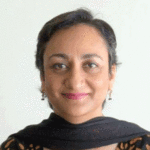
Simi Kamal
Educated at the University of Cambridge, Simi Kamal has 37 years of experience in poverty alleviation, water management, environment, climate change, food security, women’s empowerment, gender equality, inclusive development and public-private partnerships.
Kamal has a broad range of experience across the Asia-Pacific, Middle East, Europe and Africa. She is a member of several global and regional boards, committees and networks, including the Technical Committee of the Global Water Partnership. She has also served on Pakistan’s Commission on the Status of Women. Her expertise ranges from grassroots institutions and projects, right up to major national and international programmes and multi-million dollar grant funds. Kamal is the founder of several private and non-profit organisations, including Hisaar Foundation, a foundation for water, food and livelihood security.

Sharmeen Tariq
Tariq works on promoting water stewardship efforts in Pakistan through the Scotland-based Alliance for Water Stewardship. Their main focus is industry, Small and Medium Enterprises (SMEs) and Multinational Corporations (MCs), but she has been trying to broaden the focus to institutions, offices and homes, through a series of trainings based on the Project Water Education for Teachers (PWET) training structure. She is developing programmes and trainings for Women in Water Stewardship and Leadership. Tariq is an environmental auditor by profession.
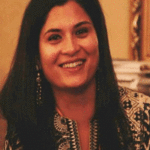
Sanaa Baxamoosa
She is an environmental practitioner with more than 10 years of experience in the water sector. She graduated with a degree in Integrated Water Resources Management from Hampshire College, Massachusetts in 2007 and is pursuing an MSc. in SustainableDevelopment from the Centre for Development, Environment and Policy, SOAS, University of London. She has worked with Hisaar Foundation as an integral member of the team since 2009. She also serves as secretary of the think tank on the Rational Use of Water, Convener of the Universities for Water Network and Country Network Manager for Cap-Net Pakistan. She was the Business Development Associate at Micro Drip Private Limited.
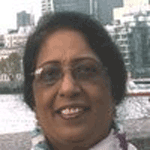
Dr. Rukhshan Roohi
She has a Ph.D in Range Science (1984) and another is expected this year in Environmental Geoscience. She is also a research cum education professional with more than 25 years experience of conducting research, teaching at graduate and postgraduate levels; curricula revision and addition of new area; initiating new programmes; developing research proposals and seeking funds through competitive grants from national and international donors; developing multi-disciplinary teams and enhancing their capacity through on-the-job trainings; and strengthening national and international linkages.
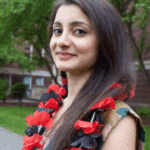
Laila Kasuri
Laila Kasuri is a Water Analyst with Global Green Growth Institute’s Investment Policy Solutions Division. Prior to joining GGGI, she was leading research on climate-smart irrigation at the Lahore University of Management Sciences (LUMS) Centre for Water Informatics and Technology, and consulting with the World Bank as part of the South Asia Water Initiative (SAWI) on river basin planning and management. She has previously worked on projects focused on flood risk reduction and the “room for the river” concept in the Lower Mississippi River, the Indus River, the Sacramento-San Joaquin River and the Ganges-Brahmaputra-Meghana Rivers. Laila has also worked with the Asian Development Bank, the US Army Corps of Engineers, and the UC Davis Center for Watershed Sciences in California.
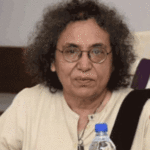
Kausar S Khan
She is a social sector analyst with a primary focus on communities and their right to address their issues by connecting with government departments, NGOs and the private sector for support. Khan uses participatory approaches with communities, subscribing to Paolo Freire’s framework of social transformation.
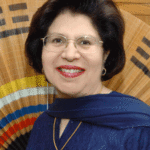
Aban Marker Kabraji
Currently Regional Director Asia of the International Union for the Conservation of Nature (IUCN), she was instrumental in setting up of the World Wild Life Fund (WWF) and IUCN in Pakistan. She has represented Pakistan and Asia at international forums and has a complete command over environmental issues in Pakistan. Kabraji rates water among the most critical areas of concern. She has led policy dialogues and negotiations across the world. She is Director of the IUCN Regional Hub for Asia-Oceania. Aban Kabraji was recently awarded the Tamgha-i-Imtiaz (Medal of Excellence), Pakistan Civil Award for 2018, in recognition of her outstanding achievements in the field of conservation. Earlier, in 1984, she was awarded the Order of the Golden Ark, a Dutch award given to luminaries in the field of conservation. Earlier winners include the late Roger Tory, Jane Goodall, Sylvia Earle and Ravindra Kumar Sinha.
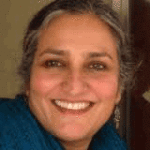
Mehjabeen Abidi Habib
An ecologist and resource equity specialist, Mehjabeen Habib worked in the NGO sector, the UN and academia; as an environmental consultant with Global Climate Adaptation Partnership (GCAP) and as Ecology Advisor to Heinrich Boll Stiftung Pakistan. She is a member of the Scientific Panel of Project Drawdown, a US-based initiative to identify the 100 most effective actions to combat global warming, is part of the faculty of Oxford University and a member of the Regional Green Dialogue, an Afghan-Pakistan group of professionals who consider issues of trans-boundary natural resource-sharing for peaceful outcomes. Abidi is the lead author of Water in the Wilderness, a book about indigenous communities in Pakistan whose lives depend on rivers, lakes and coastal areas.
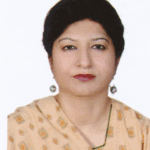
Dr Shaheen Akhtar
Dr Akhtar works with the International Relations Department of National Defence University. She has a Ph.D in International Relations from the Quaid-i-Azam University (QAU), Islamabad and a Postgraduate Diploma in Conflict Resolution, Department of Peace and Conflict Research, Uppsala University, Sweden. Her area of specialisation is regional security, conflict resolution and peace-building in South Asia (Kashmir and Sri Lanka), non-traditional security; energy, water, climate change and gender issues in the region and foreign policy of major powers.
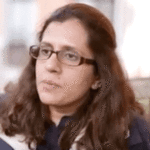
Hina Lotia
Hina Lotia is Director Programmes, Programme Development Department at LEAD Pakistan. She has more than 14 years of experience in the development sector and spearheaded the team that developed LEAD’s programme on Climate Change – Climate Action Program (L-CAP), a five-year initiative to promote climate compatible development in the country. She initiated the Climate Development Knowledge Network (CDKN) project in Asia.
She is developing the 5-year Water Programme and its implementation strategy for LEAD. It will focus on providing technical assistance, research, capacity building and public policy engagement in areas of disasters, droughts, transboundary water, groundwater and water quality from an access, equity and hazard perspective. She has represented the institution at national and international forums and served as a trainer at various LEAD events.
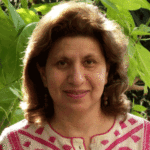
Meher Nosherwani
Meher Nosherwani has a Masters in Sociology from the University of Essex, United Kingdom. As a member of IUCN’s Pakistan National Committee, she has been a member of IUCN’s Commission on Environmental, Economic and Social Policy (CEESP) since 2010, as well as a member of the Sustainable Livelihoods and Sustainable Use Specialist Group. She works as consultant and researcher on Gender and Environment issues and is the Regional Vice-Chair of the Commission on Environmental, Economic, and Social Policy (CEESP) for Asia. Nosherwani is also Technical Advisor to the Trust for Conservation of Coastal Resources (TCCR).
Ms. Fazilda Nabeel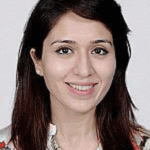
She is a Doctoral Researcher at the University of Sussex and was a visiting researcher at the Lahore University of Management Sciences (LUMS) Centre for Water Informatics and Technology in her fieldwork year. She is a LEAD Fellow of Cohort 18 on the theme of Trans-boundary Water Resources (2014-15). Fazilda’s research analyses the nature and underlying causes of problems of groundwater, (non)governance in the Indus Basin of Pakistan, particularly marginalisation of groundwater governance in comparison to technical, legal, institutional development of surface water. Fazilda has six years experience of work on the South Asian Human Development Reports issued by the Mahbub ul Haq Centre for Human Development.
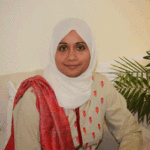
Dr. Afreen Siddiqi
She is a research scientist at the Massachusetts Institute of Technology (MIT) and an Associate Director of the MIT Strategic Engineering Research Group. She is also a visiting scholar with the Science, Technology, and Public Policy Program at Harvard Kennedy School’s Belfer Center for Science and International Affairs. Dr. Siddiqi has a Bachelor of Science in Mechanical Engineering, a Master of Science in Aeronautics and Astronautics, and a Ph.D. in Aerospace Systems, all from MIT. Her expertise is in quantitative modelling and systems analysis. Her current work investigates emerging critical linkages between water, energy, food security and infrastructure planning under uncertainty. She serves in teaching and advisory roles in a number of international education and policy institutions.

Dr. Saher Asad
She is Assistant Professor, Department of Economics at LUMS. She teaches water economics and works on many Water, Informatics and Technology (WIT) projects, giving input on gender issues as well as water economics. Her research interests include groundwater management in Pakistan’s Indus Basin.
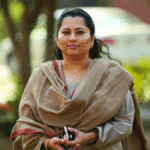
Dr Zehra Waheed
Assistant Professor at the Suleman Dawood School of Business (SDSB), LUMS, Waheed has research interests in urban water distribution and water institutions. Her current project focuses on the application of Social Network Analysis to Water Systems in the city of Lahore.
Dr. Arjumand Zehra Zaidi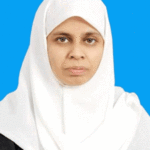
Dr Zaidi is Senior Research Fellow at the Mehran University of Engineering and Technology (MUET), U.S.-Pakistan Center for Advanced Studies in Water.
Her professional experience is in the field of environmental evaluation and decision-making. Research interests include optimisation and modelling of water resources, environmental and disaster management systems. Most of her research work pertains to environmental decision-making with the help of various numerical techniques and Geographical Information Systems (GIS), using satellite data.
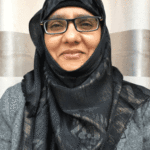
Dr. Aneela Yasmin
She is Associate Professor, Mehran University of Engineering and Technology (MUET), U.S.-Pakistan Center for Advanced Studies in Water. Yasmin has an MSc (Biotechnology) from the University of Karachi, and is a PhD (Molecular Biology) from the University of Hanover, Germany and has done post-doctorate work in Australia. She recently completed a project on the role of algae in wastewater treatment and bioenergy production, with a focus on microscopic, molecular (genotyping) and metabolic characterisation of biofuel from algae. She teaches Chemistry and Biology of Water and Sanitation. Research interests encompass Sustainable Development Goals 6.2 and 6.3, focusing on wastewater characterisation, treatment and its use for vegetable irrigation purposes.
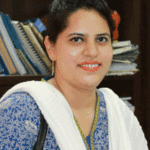
Dr. Syeda Sara Hassan
Dr Hassan is Assistant Professor, Mehran University of Engineering and Technology (MUET), U.S.-Pakistan Center for Advanced Studies in Water. She works within advanced electro-analytical techniques, fabrication of nano materials and their applications to remove hazardous metal ions at trace level from environmental, real water and industrial waste water.

Aisha Khan
Aisha Khan is the founding member and Executive Director for Civil Society Coalition for Climate Change (CSCCC) and CEO of Mountain and Glacier Organisation (MGPO) with responsibilities of management, policy planning, government relations, advocacy, capacity-building and sustainability of programme activities at the national, sub-national and international level. She has over 18 years experience in development work, designing and implementing sustainable development programmes to build resilience and reduce vulnerability of unserved and underserved communities. Prior to serving as Executive Director and CEO, she lived in 10 countries in Europe, Latin America, Africa, North America, South East Asia and South West Asia. Her work includes interaction with the government and civil society on issues such as education, gender and conservation of the natural environment.
Rabia Zafar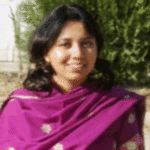
Rabia Zafar started her professional career as a Lecturer with Sardar Bahadur Khan Women’s University Quetta, teaching Alkaloids Chemistry, Spectroscopy, Carbohydrate Chemistry and Organic Synthetic Chemistry. She was later appointed assistant professor in the Department of Environmental Sciences.
She has worked extensively on a ‘Soil Restoration’ project in Australia. She currently works on climate change impact studies in Balochistan and has focused on the incorporation of climate change content in the primary and secondary school curricula in Balochistan.
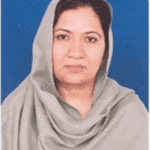
Dr. Lubna Bukhari
Dr Lubna Bukhari is Director General PCRWR (Pakistan Council for Research in Water Resources) National Water Quality Laboratory (NWQL). She is associated with the state of the art Pakistan-Korea National Capacity Building Institute (NCBI), equipped with a host of equipment and facilities for training and research, which will offer diploma courses and full-fledged degree courses in the future.
There are several women research associates at the PCRWR as well.
Our list may be long, but it is by no means exhaustive. What is even more encouraging is the large number of female students in the field at MUET in Jamshoro, at LUMS and at the Karakoram University in Gilgit.
It is high time that the all-male preserve changed and made way for the ladies at the water table!
A freelance journalist, with an experience of print, electronic and web media. She writes, and trains media on climate change, gender and labour issues, as well as media ethics.


